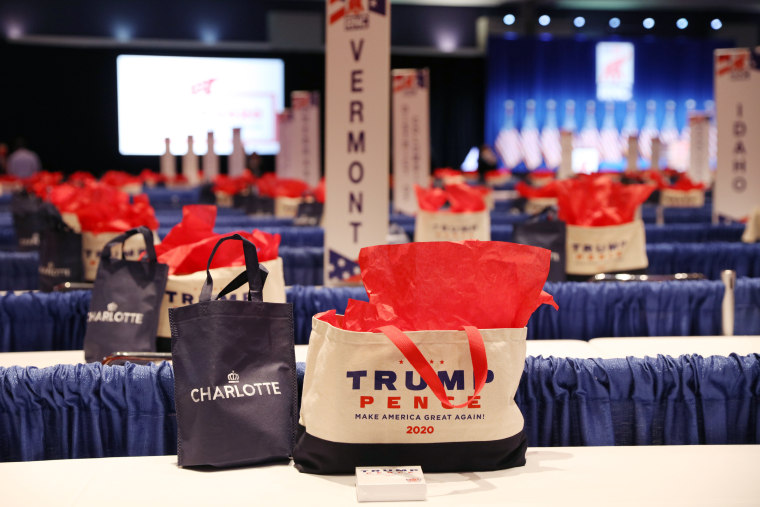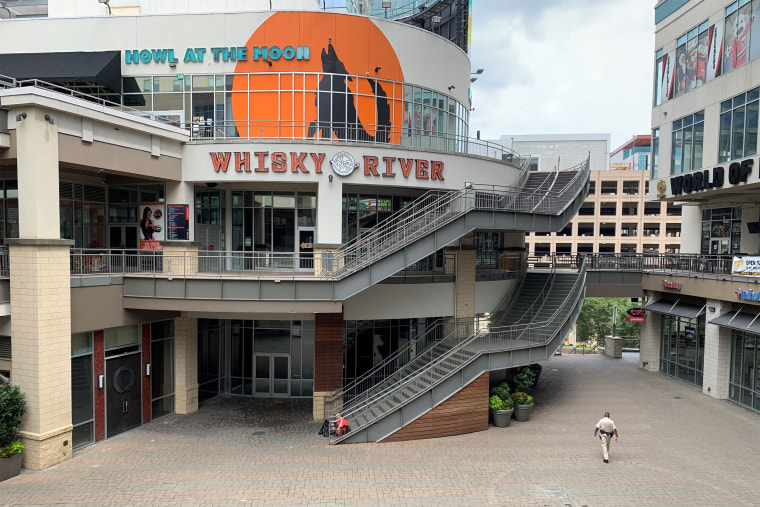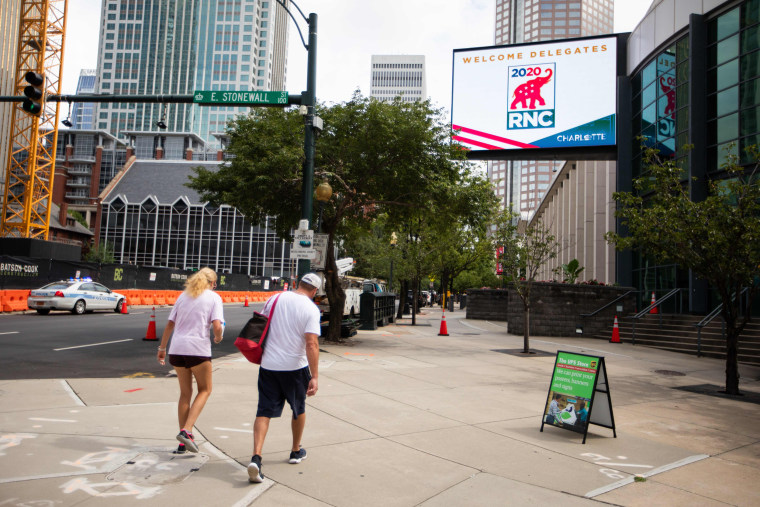CHARLOTTE, N.C. — Political celebrities and cable news stars were supposed to fill the streets. Hotels thought they would hit capacity. Rooftop bars expected to book up with late-night parties, and nearby restaurants anticipated an endless crush of customers. There were plans for live music concerts and fireworks.
Instead, uptown Charlotte, the official home of the 2020 Republican National Convention, was nearly deserted as the meeting to formally nominate President Donald Trump as the GOP presidential nominee kicked off Monday morning.
On the eve of the convention, restaurants around the Charlotte Convention Center remained closed. Street signs and storefronts, which would normally be covered in RNC signage, displayed social distancing guidelines. A truck with an anti-Trump billboard in its bed drove around the uptown area, but aside from a few reporters and police officers, no one was there to see it. A few scattered demonstrations took place around the city ahead of the event — but as Republicans arrived in the uptown area, there were no protesters in sight.
"It's empty. Even the locals aren't around," said Vinay Patel, principal at SREE Hotels, which includes 12 hotels in the Charlotte area, two of which are within minutes of the Charlotte Convention Center, where Republicans gathered.
"It is a very eerie feeling," Patel said, adding that all 12 of his Charlotte hotels had been contracted with the RNC.
The coronavirus pandemic upended everything.
Trump, intent on holding an in-person convention, announced in June he would move the RNC to Jacksonville, Florida, after North Carolina Gov. Roy Cooper did not promise that Republicans could hold a full-scale convention due to the pandemic.
Republicans scrapped the Jacksonville plans as the virus in Florida worsened. They eventually settled on holding just the procedural portion in Charlotte, with North Carolina officials granting the RNC an exception to the 10 person limit on indoor activities, moving the high-profile speeches to Washington.
And event after event — ranging from a prayer breakfast at the Billy Graham Library, to a luncheon honoring the 100th anniversary of the 19th Amendment that guaranteed women the right to vote — was called off.
“We pretty much had to cancel everything we had on our plate," said John Lassiter, CEO of Charlotte’s RNC 2020 host committee.

Lassiter had planned a massive 12,000-person "welcome party" for Sunday night that would have spilled into three large ballrooms and showcased different parts of North Carolina.
In the "mountain" section, guests would listen to bluegrass music and eat western North Carolina barbecue. In “Piedmont,” the urban center, they would sample craft beers and food trucks. In the "east," attendees could find vinegar-based barbecue and beach music.
“In our mind, it would have been the best political convention in U.S. history," said Lassiter.
The scaled-down RNC cuts especially deep for Charlotteans who know first-hand the kind of energy and money a political convention can bring to a city.
The Democrats selected Charlotte in 2012 for their convention to renominate President Barack Obama. The event drew 35,000 people to the city, and roughly 1,200 different events took place.
The DNC that year brought in more than $160 million — the most net-positive economic impact ever produced by a single Charlotte event, according to the mayor’s office at the time.
That economic boon is almost entirely missing this year.
Republicans planned to have just 336 delegates in Charlotte, six from each state and territory, for procedural business and roll call. While 15,000 members of the media flooded Charlotte in 2012, the RNC this time around was closed to all but a few reporters. Those in town did not plan to stay past the Monday events.
Download the NBC News app for alerts and all the latest on the Republican convention.
The Fortune 500 executives, lobbyists, U.S. ambassadors, foreign trade representatives, and others who were expected to travel to Charlotte did not show.
The EpiCentre shopping center, which in 2012 served as the media hub of the DNC, was almost entirely empty as Republicans convened Monday.

BlackFinn American Saloon, a restaurant in the EpiCentre, sold tables at $500 in 2012 for fans of MSNBC’s “Morning Joe” to watch the program be broadcast live. CNN turned a Mexican restaurant into "CNN Grill."
Mary Jayne Wilson, the director of operations at Amelie’s French Bakery in Charlotte, handled breakfast catering for the “Morning Joe” set in 2012, and remembered that week as “very intense” and “great for business.”
“It’s definitely different this year. We had a lot of potential," Wilson said, adding that she had been in talks with three different news organizations to rent out her space for the week. “We were making big plans to do big things.”
“There were several places hanging onto the RNC as a way to gain some revenue to survive a little longer,” she continued. “Obviously that's not happening.”
Patel also lamented the week as a missed chance, especially for small businesses.
“This was an opportunity — a light at the end of the tunnel considering the pandemic — for some revenue to come back," Patel said.
“I held out hope until the very end, until the day they announced they were going to Jacksonville," he added. "I was very frustrated."

